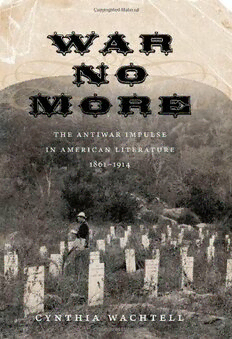
War No More: The Antiwar Impulse in American Literature, 1861-1914 PDF
248 Pages·2010·1.216 MB·English
Most books are stored in the elastic cloud where traffic is expensive. For this reason, we have a limit on daily download.
Preview War No More: The Antiwar Impulse in American Literature, 1861-1914
Description:
Until now, scholars have portrayed America's antiwar literature as an outgrowth of World War I, manifested in the works of writers such as Ernest Hemingway and John Dos Passos. But in War No More, Cynthia Wachtell corrects the record by tracing the steady and inexorable rise of antiwar writing in American literature from the Civil War to the eve of World War I. Beginning with an examination of three very different renderings of the chaotic Battle of Chickamauga--a diary entry by a northern infantry officer, a poem romanticizing war authored by a young southerner a few months later, and a gruesome story penned by the veteran Ambrose Bierce--Wachtell traces the gradual shift in the late nineteenth century away from highly idealized depictions of the Civil War. Even as the war was under way, she shows, certain writers--including Herman Melville, Walt Whitman, John William De Forest, and Nathaniel Hawthorne--quietly questioned the meaning and morality of the conflict. As Wachtell demonstrates, antiwar writing made steady gains in public acceptance and popularity in the final years of the nineteenth century and the opening years of the twentieth, especially during the Spanish-American War and the war in the Philippines. While much of the era's war writing continued the long tradition of glorifying battle, works by Bierce, Stephen Crane, Mark Twain, William Dean Howells, William James, and others increasingly presented war as immoral and the modernization and mechanization of combat as something to be deeply feared. Wachtell also explores, through the works of Theodore Roosevelt and others, the resistance that the antiwar impulse met. Drawing upon a wide range of published and unpublished sources, including letters, diaries, essays, poems, short stories, novels, memoirs, speeches, magazine and newspaper articles, and religious tracts, Wachtell makes strikingly clear that pacifism had never been more popular than in the years preceding World War I. War No More concludes by charting the development of antiwar literature from World War I to the present, thus offering the first comprehensive overview of one hundred and fifty years of American antiwar writing.
See more
The list of books you might like
Most books are stored in the elastic cloud where traffic is expensive. For this reason, we have a limit on daily download.
